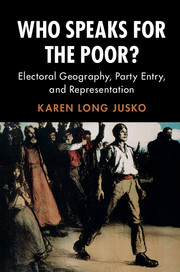Crossref Citations
This Book has been
cited by the following publications. This list is generated based on data provided by Crossref.
Kuo, Didi
2019.
Comparing America: Reflections on Democracy across Subfields.
Perspectives on Politics,
Vol. 17,
Issue. 3,
p.
788.
HARRIS, J. ANDREW
and
POSNER, DANIEL N.
2019.
(Under What Conditions) Do Politicians Reward Their Supporters? Evidence from Kenya’s Constituencies Development Fund.
American Political Science Review,
Vol. 113,
Issue. 1,
p.
123.
Bateman, David A.
and
Teele, Dawn Langan
2020.
A developmental approach to historical causal inference.
Public Choice,
Vol. 185,
Issue. 3-4,
p.
253.
Weber, Till
2020.
Discreet Inequality: How Party Agendas Embrace Privileged Interests.
Comparative Political Studies,
Vol. 53,
Issue. 10-11,
p.
1767.
Däubler, Thomas
2020.
National policy for local reasons: how MPs represent party and geographical constituency through initiatives on social security.
Acta Politica,
Vol. 55,
Issue. 3,
p.
472.
Sanders, M. Elizabeth
2020.
From the First Gilded Age to the Second: Alternative Coalition Strategies for a Transformed Party and Policy System.
The Journal of the Gilded Age and Progressive Era,
Vol. 19,
Issue. 2,
p.
296.
Drutman, Lee
2022.
Moderation, Realignment, or Transformation? Evaluating Three Approaches to America’s Crisis of Democracy.
The ANNALS of the American Academy of Political and Social Science,
Vol. 699,
Issue. 1,
p.
158.
Polacko, Matthew
2022.
The rightward shift and electoral decline of social democratic parties under increasing inequality.
West European Politics,
Vol. 45,
Issue. 4,
p.
665.
Walter, André
2022.
The social origins of Christian democracy: rural–urban migration, interest group preemption, and the rise of the Catholic workers’ movement.
Socio-Economic Review,
Vol. 20,
Issue. 2,
p.
687.
Bengtsson, Erik
and
Morgan, Marc
2022.
Scandinavia and South America—A Tale of Two Capitalisms.
p.
287.
Wiedemann, Andreas
2022.
Redistributive Politics Under Spatial Inequality.
SSRN Electronic Journal ,
Tuorto, Dario
2022.
Underprivileged Voters and Electoral Exclusion in Contemporary Europe.
p.
83.
Polacko, Matthew
2023.
Turning off the base: Social democracy's neoliberal turn, income inequality, and turnout.
Politics & Policy,
Vol. 51,
Issue. 4,
p.
538.
Polacko, Matthew
2023.
Who benefits from the social democratic march to the middle?.
European Political Science Review,
Vol. 15,
Issue. 4,
p.
502.
MORGAN-COLLINS, MONA
2023.
Bringing in the New Votes: Turnout of Women after Enfranchisement.
American Political Science Review,
p.
1.
Bochsler, Daniel
Grofman, Bernard
and
Hänni, Miriam
2023.
Fit for parliament: a new index of electability, assessing the electoral success of group-based parties.
Journal of Elections, Public Opinion and Parties,
p.
1.
SCHEVE, KENNETH
and
SERLIN, THEO
2023.
The German Trade Shock and the Rise of the Neo-Welfare State in Early Twentieth-Century Britain.
American Political Science Review,
Vol. 117,
Issue. 2,
p.
557.
Kawata, Keisuke
McElwain, Kenneth Mori
and
Nakabayashi, Masaki
2024.
Narrative premiums in policy persuasion.
Political Psychology,
Vol. 45,
Issue. 2,
p.
383.





